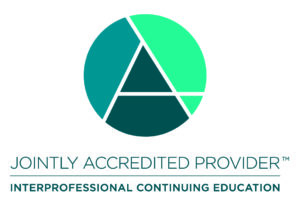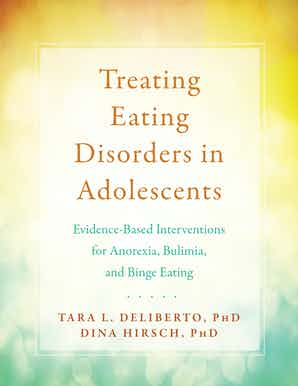
Mindful and Compassionate Treatment of People with Eating Disorders
People with eating disorders can so often be undiagnosed, untreated, judged, and misunderstood.
And eating disorders don’t discriminate. Anyone — regardless of age, race, gender, sexual orientation, or socioeconomic status — can have an eating disorder.
The number of eating disorder cases has risen dramatically over the course of the pandemic, leaving more and more people suffering with a potentially deadly mental illness and lacking the support they need.
It’s never been more important for caring mental health professionals to step into sessions equipped with the confidence and training to face this issue head-on.
This course will provide you with the clinical tools necessary to help mindfully and compassionately combat eating disorders in the mental health field, while learning to assess and treat this widespread issue in your clinical practice.
Inside the Course
Over four live online sessions, you will learn about how eating disorders can impact people from any background, as well as how to non-judgmentally assess and treat them in diverse populations.
You’ll also explore how the nature of eating disorders often necessitates a community or family — rather than individualistic — approach. You’ll learn practical methods for involving family members, friends, and communities. And you’ll learn effective ways to collaborate with professionals from a variety of disciplines, including when to make referrals to medical professionals and how to work together with your client’s doctor to build an informed and multidisciplinary treatment approach.
Dr. Tara Deliberto will then guide you through an exploration of the function of eating disorders through the lens of experiential avoidance. Eating disorder behaviors (e.g., food restriction, avoidance, purging, obsessionality, etc.) will be framed as avoidance of aversive internal experiences such as fear of fatness, fear of the consequences of weight gain (e.g., abandonment, rejection, losing status/power etc.), internal physical sensations (e.g., fullness), and thoughts (e.g., “I’m a failure if I gain weight”).
Through this approach, you’ll develop a deeper understanding of the key similarities and differences in how experiential avoidance manifests for clients struggling with eating disorders versus other forms of mental illness. And you’ll learn how to adapt the various exposure techniques you already know to help clients rebuild their relationship to their bodies.
This content-filled course will cover a range of topics designed to help you create effective and holistic treatment strategies, including:
- The role of food insecurity, colonialism, and trauma in the onset of eating disorders
- How to make appropriate referrals based on medical condition
- Harnessing outside intervention as a way of addressing experiential avoidance
- Cultural factors affecting family and carer intervention
- Methods of addressing experiential avoidance of food
- Compassion-focused therapy exercises designed to foster self-compassion, experiential acceptance, and gratitude
- How to move from positively judging the body to body acceptance
- Helping clients build a respectful, intimate, and two-way relationship with the body
- And more…
You’ll leave this course with the knowledge, tools, and confidence to help break free from experiential avoidance, rebuild relationships, and discover a life outside of their eating disorder.
To enroll, select your pricing option in the right-hand menu and click “Register Now” and we’ll reserve your spot in this training.
This training is worth 8 CE credit hours if attended live. While we can only provide CE to those who are present – i.e. logged in – for all live sessions, Praxis webinars are recorded for later viewing. Registrants may access these recordings at any time for up to six months from the conclusion of the training to which they pertain.
Prior to registering, please review speaker-planner conflict of interest disclosures and complete CE information.
Session 1 | April 14, 2022, 2 PM—4 PM EDT
Foundations in Eating Disorders
Session 2 | April 21, 2022, 2 PM—4 PM EDT
Family Intervention in the Treatment of Eating Disorders
Session 3 | April 28, 2022, 2 PM—4 PM EDT
Addressing Experiential Avoidance
Session 4 | May 5, 2022, 2 PM—4 PM EDT
Body Image
Participants will be able to:
- Discuss how to treat people with eating disorders from a compassionate and non-judgmental stance
- Accurately identify and assess eating disorders without bias towards thin, white, women
- Describe how to refer patients to appropriate levels of care (LoC) based on medical – rather than psychiatric – necessity
- Assess the function of eating disorder behaviors (i.e., experiential avoidance)
- Discuss experiential avoidance in eating disorders
- Discuss how treating patients with ego-syntonic illnesses (e.g., anorexia nervosa) differs from the treatment of people with ego-dystonic illnesses (e.g., anxiety/depression)
- Describe ways to implement family interventions, when necessary, in the treatment of eating disorders
- Describe how to implement individual interventions aimed at decreasing eating disorder behavior
- Describe how to implement individual interventions aimed at improving body image
Please review complete CE and conflict-of-interest disclosure information prior to registering. This live online course is sponsored by Praxis Continuing Education and Training and is approved for 8 CE Hours by the following listed below. There was no commercial support for this activity. None of the planners or presenters for this educational activity have relevant financial relationship(s) to disclose with ineligible companies whose primary business is producing, marketing, selling, re-selling, or distributing healthcare products used by or on patients.
Praxis CET maintains responsibility for the program with the CE approvals outlined below:
Joint Accreditation: In support of improving patient care, Praxis Continuing Education and Training, Inc is jointly accredited by the Accreditation Council for Continuing Medical Education (ACCME), the Accreditation Council for Pharmacy Education (ACPE), and the American Nurses Credentialing Center (ANCC), to provide continuing education for the healthcare team.
In support of improving patient care, Praxis Continuing Education and Training, Inc is jointly accredited by the Accreditation Council for Continuing Medical Education (ACCME), the Accreditation Council for Pharmacy Education (ACPE), and the American Nurses Credentialing Center (ANCC), to provide continuing education for the healthcare team.
IPCE: This activity was planned by and for the healthcare team, and learners will receive 8 Interprofessional Continuing Education (IPCE) credit for learning and change.
Nursing: Praxis Continuing Education and Training, Inc designates this activity for a maximum of 8 ANCC contact hours.
Physicians: Praxis Continuing Education and Training, Inc designates this live internet activity for a maximum of 8 AMA PRA Category 1 Credits™. Physicians should claim only the credit commensurate with the extent of their participation in the activity.
Psychologists: ![]() Continuing Education (CE) credits for psychologists are provided through the co-sponsorship of the American Psychological Association (APA) Office of Continuing Education in Psychology (CEP). The APA CEP Office maintains responsibly for the content of the programs.
Continuing Education (CE) credits for psychologists are provided through the co-sponsorship of the American Psychological Association (APA) Office of Continuing Education in Psychology (CEP). The APA CEP Office maintains responsibly for the content of the programs.
Social Workers: As a Jointly Accredited Organization, Praxis Continuing Education and Training, Inc is approved to offer social work continuing education by the Association of Social Work Boards (ASWB) Approved Continuing Education (ACE) program. Organizations, not individual courses, are approved under this program. State and provincial regulatory boards have the final authority to determine whether an individual course may be accepted for continuing education credit. Praxis Continuing Education and Training, Inc maintains responsibility for this course. Social workers completing this course receive 8 clinical continuing education credits.
Drug and Alcohol Counselors: This course has been approved by Praxis Continuing Education and Training, Inc, as a NAADAC Approved Education Provider, for 8 CE hours. NAADAC Provider #165310, Praxis Continuing Education and Training, Inc, is responsible for all aspects of its programming.
National Counselors:  Praxis Continuing Education and Training, Inc. has been approved by NBCC as an Approved Continuing Education Provider, ACEP No. 6759. Programs that do not qualify for NBCC credit are clearly identified. Praxis Continuing Education and Training, Inc. is solely responsible for all aspects of the programs.
Praxis Continuing Education and Training, Inc. has been approved by NBCC as an Approved Continuing Education Provider, ACEP No. 6759. Programs that do not qualify for NBCC credit are clearly identified. Praxis Continuing Education and Training, Inc. is solely responsible for all aspects of the programs.
NY Social Workers: Praxis Continuing Education and Training, Inc is recognized by the New York State Education Department’s State Board for Social Work as an approved provider of continuing education for licensed social workers #SW-0467
NY Counselors: Praxis Continuing Education and Training, Inc. is recognized by the New York State Education Department’s State Board for Mental Health Practitioners as an approved provider of continuing education for licensed mental health counselors. #MHC-0198.
NY Psychologists: Praxis Continuing Education and Training, Inc. is recognized by the New York State Education Department’s State Board for Psychology as an approved provider of continuing education for licensed psychologists #PSY-0002.
Deliberto, T.L. and Hirsch, D. (2017). Treating Eating Disorders in Adolescents. Oakland, CA: New Harbinger.
Agras, William S., (2019). Cognitive Behavior Therapy for the Eating Disorders. Psychiatric Clinics of North America 42(2), 169-179.
Le Grange, D., Hughes, E. K., Court, A., Yeo, M., Crosby, R.D., Sawyer, S.M. (2016). Randomized Clinical Trial of Parent-Focused Treatment and Family-Based Treatment for Adolescent Anorexia Nervosa. Journal of the American Academy of Child & Adolescent Psychiatry 55(8), 683-692.
Fairburn, C.G., Bailey-Straebler, S., Basden, S., Doll, H.A., Jones, R., Murphy, R., O’Connor, M.E., Cooper, Z. (2015). A transdiagnostic comparison of enhanced cognitive behaviour therapy (CBT-E) and interpersonal psychotherapy in the treatment of eating disorders. Behaviour Research and Therapy 70, 64-71.
We understand, sometimes things come up!
Praxis will offer a full refund to registrants of both live and live-online trainings who cancel their registration up to 14 days before the course or workshop start date, minus an administrative processing fee of $30 for a 2-day workshop or online course, and a $50 fee for a 4-day workshop. If cancelled within 14 days, no refund will be issued, however, a credit for the same amount will be applied toward another learning product, which expires within 1 year. Please email us at online@praxiscet.com to cancel a registration.



